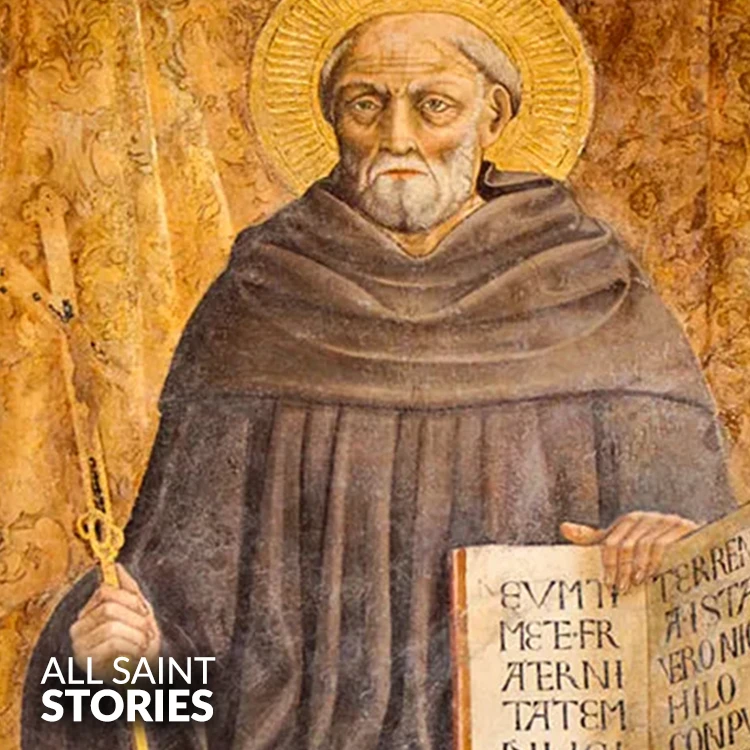"Saint John Gualbert, You who forgave your enemy and chose peace over vengeance, Help us to live with compassion and forgiveness in our hearts. Guide us on our path of faith, and intercede for us that we may grow in holiness. Through your example, teach us to embrace humility and love, and may we find strength in your prayers. Amen."
ST. JOHN GUALBERT
ST. JOHN GUALBERT

St. John Gualbert of Florence, known for his dramatic conversion, founded the Vallombrosan Order after choosing forgiveness over revenge. He is celebrated for his dedication to penance, humility, and his devotion to God. His feast day is on July 12.
St. John Gualbert, born in 985 in the region of Florence, Italy, came from a noble family and was initially immersed in the lifestyle of the nobility. His father, a prominent figure, hoped that John would follow in his footsteps, but God had other plans for him. The pivotal moment in his life came when he was confronted with the death of his brother, who had been slain by a man from a rival family. It was common at the time for families to seek revenge for such acts, and John was prepared to exact vengeance upon the killer.
However, as he sought revenge, John experienced a profound spiritual transformation. While on his way to confront the man, he was struck by a powerful vision of Christ on the cross. This divine encounter led to an immediate change of heart. John Gualbert chose the path of forgiveness, sparing the life of his brother’s killer and embracing peace. This act of mercy marked the beginning of his religious journey.
Deeply moved by his experience, John withdrew from his worldly life and sought a life of penance and prayer. He entered the Benedictine monastery of San Salvi in Florence, where he committed himself to the monastic life, dedicating his existence to God. His commitment to humility, prayer, and penance was evident in all his actions, and his example of devotion inspired many others.
After joining the monastery, John Gualbert sought to reform the Benedictine monastic life. He found that many of the monks had become lax in their practices, so he took it upon himself to restore the original ideals of the Rule of St. Benedict. His reforms emphasized a strict adherence to monastic discipline, including a life of prayer, work, and penance. Through his leadership, John helped to strengthen the monastic community, calling for a return to the spiritual and ascetic practices that he believed were at the heart of true Christian life.
In 1039, John Gualbert, having gained a reputation for holiness and zeal for reform, founded a new religious order—the Vallombrosan Order. The name "Vallombrosan" comes from the location of the order’s first monastery, situated in the valley of the River Arno, near Florence. The Vallombrosans became known for their austere lifestyle, their dedication to prayer and work, and their commitment to the Benedictine Rule. The order quickly spread throughout Italy, with several new monasteries being established.
St. John Gualbert’s devotion to the monastic life, as well as his commitment to forgiveness, humility, and penance, were key aspects of his spirituality. His example continues to inspire countless Christians around the world. He was recognized for his saintliness during his lifetime, and after his death in 1073, his sanctity was further acknowledged by the Catholic Church.
St. John Gualbert passed away on July 12, 1073, after living a life of deep prayer, humility, and service to God. His death marked the end of a life that had been completely transformed by grace. He was canonized as a saint by Pope Clement III in 1193. His feast day is celebrated on July 12, the anniversary of his death, and he is venerated as a model of forgiveness and monastic devotion.
His legacy endures through the Vallombrosan Order, which continues to live by the principles he established, focusing on a life of asceticism, prayer, and active service to the Church. St. John Gualbert’s story is one of dramatic conversion, deep faith, and dedication to the Christian ideals of peace, forgiveness, and humility. His life is a testament to the power of grace and the transformative nature of God’s mercy, and his example continues to be an inspiration for those seeking to live lives of holiness and devotion.
As the founder of the Vallombrosan Order, St. John Gualbert left an indelible mark on the history of monasticism. The order’s focus on simplicity, prayer, and discipline continues to influence religious communities today. His story is a powerful reminder that no matter what path one has walked in life, God’s mercy is always available for those who seek it, and true transformation comes through forgiveness, humility, and a commitment to God’s will.
Video Not Found
The information on this website is compiled from various trusted sources. While we aim for accuracy, some details may be incomplete or contain discrepancies.
If you notice any errors or have additional information about this saint, please use the form on the left to share your suggestions. Your input helps us improve and maintain reliable content for everyone.
All submissions are reviewed carefully, and your personal details will remain confidential. Thank you for contributing to the accuracy and value of this resource.
Credits & Acknowledgments
- Anudina Visudhar (Malayalam) – Life of Saints for Everyday
by Msgr. Thomas Moothedan, M.A., D.D. - Saint Companions for Each Day
by A. J. M. Mausolfe & J. K. Mausolfe - US Catholic (Faith in Real Life) – Informational articles
- Wikipedia – General reference content and images
- Anastpaul.com – Saint images and reflections
- Pravachaka Sabdam (Malayalam) – Saint-related content and insights
We sincerely thank these authors and platforms for their valuable contributions. If we have unintentionally missed any attribution, please notify us, and we will make the correction promptly.
If you have any suggestion about ST. JOHN GUALBERT
Your suggestion will help improve the information about this saint. Your details will not be disclosed anywhere.
© 2026 Copyright @ www.allsaintstories.com




 English
English
 Italian
Italian
 French
French
 Spanish
Spanish
 Malayalam
Malayalam
 Russian
Russian
 Korean
Korean
 Sinhala
Sinhala
 Japanese
Japanese
 Arabic
Arabic
 Portuguese
Portuguese
 Bantu
Bantu
 Greek
Greek
 German
German
 Dutch
Dutch
 Filipino
Filipino